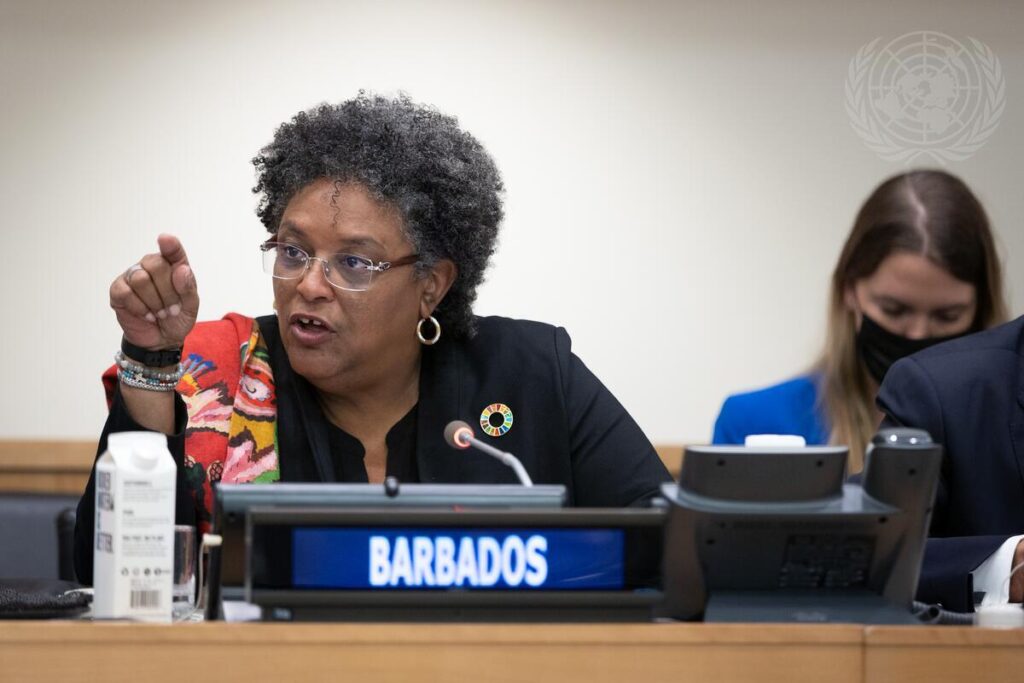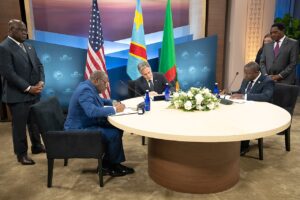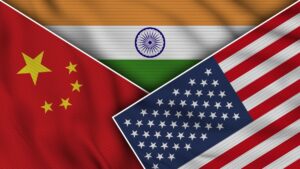The Red cell project
The Red Cell was a small unit created by the CIA after 9/11 to ensure the analytic failure of missing the attacks would never be repeated. It produced short briefs intended to spur out-of-the-box thinking on flawed assumptions and misperceptions about the world, encouraging alternative policy thinking. At another pivotal time of increasing uncertainty, this project is intended as an open-source version, using a similar format to question outmoded mental maps and “strategic empathy” to discern the motives and constraints of other global actors, enhancing the possibility of more effective strategies.
A Widening Chasm
The Ukraine War could be a turning point, not just for relations between the West and Russia and China, but also for the West’s relationship with the majority of the world’s population in the Global South. Assuming that the countries comprising the Global South would react the same way Western publics did to the Russian invasion was a huge miscalculation.
Unfortunately, the split between the West and the Global South is widening. For many developing countries, the alienation toward the West did not begin with Ukraine; rather, it can be traced to the West’s disregard for their struggle with the COVID-19 pandemic, if not further back. Westerners need to acknowledge the negative impacts of some of their policies toward developing countries, which have too often created or aggravated turmoil, such as in Iraq and Haiti. Nevertheless, which side is right in their response to the Ukraine war matters less than the growing negative perception by the Global South of the “self-centered” West intent on increasing its power by squeezing China and Russia economically and politically. Partly in response to Western pressure on them, Beijing and Moscow have upped their game in the Global South.
If the West wants to remain relevant as population and economic growth shift over time to developing countries, then it must pay more attention to the Global South. The health of planet Earth requires a united fight against climate change; otherwise, all are losers. Similarly, as with Middle East insurgencies and terrorism in the early 2000s, instability in one region can pose a threat elsewhere. By supporting stability and prosperity outside their borders, Western countries also protect their interests. Contrary to what some may think, the West relies on the Global South through longstanding economic and trade, security and diplomatic exchanges and partnerships. Developing countries also contribute to science advancement and greatly influence global culture, from the food to the entertainment industry that, in turn, also enable more economic opportunities for Western economies.
Ambivalence over Ukraine
In the Spring 2022 Ipsos poll of 27 Western and developing countries, publics in the selected Global South nations opposed the Russian invasion. On average, across all countries, there was a consensus that “doing nothing in Ukraine will encourage Russia to take further military action.” However, for Hungary, India, Malaysia and Saudi Arabia, the opinion that “the problems of Ukraine are none of our business and we should not interfere” prevailed. This view is also shared by half of those surveyed in Argentina, Israel, and Mexico. In contrast, except for Hungary, between 65% and 80% of those living in all eight other European Union member countries surveyed, as well as in Great Britain, the United States, Canada, Australia, Japan, and South Korea, disagree.
There are sharper divisions on providing military support or sending troops to Ukraine. Publics in developing countries oppose sending military aid, including troops. On sanctions, “while more than 75% in South Korea and Poland agree, fewer than 40% in Argentina, Brazil, Hungary, Mexico, and Peru do so.” Moreover, publics in developing countries included in the polling oppose banning Russian energy because they fear price increases.
Western Incomprehension of the Global South and Vice Versa
The Global South’s ambivalence on Ukraine is also reflected in the UN General Assembly resolution against Russia’s recent annexation of four provinces. Overall, a vast majority condemned Russia’s actions, but 52 countries from the Global South, with most in Africa and Asia, opposed or abstained in voting on the resolution, showing little change since a similar vote in March, despite extensive Russian atrocities. Eurasian countries including India as well as China, Mongolia, Pakistan, and all five Central Asian states plus Iran did not vote for the resolution. As the Quincy Institute’s Sarang Shidore notes, “almost all these states also belong to the [China-created] Shanghai Cooperation Organization — a rising, if still early-stage — international organization representing one of the core geographies of the global order.” Twenty-four African states also abstained, opposed, or did not vote for the resolution. Latin America and Caribbean governments — except for Bolivia, Cuba, El Salvador, Honduras, Nicaragua, and Venezuela — largely voted for it. “By population, a majority of the Global South and governments representing nations with close to half of the world’s population did not agree with Washington’s position when put to a public vote,” Shidore continues.
For the West, the fact that so many countries in the Global South are not seized by the Ukraine crisis appears incomprehensible, if not morally wrong. French President Emmanuel Macron accused neutrals in the Global South “…who remain silent today, despite themselves or secretly with a certain complicity, are serving the cause of a new imperialism, a contemporary cynicism that is destroying the world order…”
Nevertheless, Western pressure on Global South countries to ensure they support the West’s policy against Russia has been received coldly by several developing countries. For instance, South Africa’s foreign affairs minister, Naledi Pandor, decried during a joint press conference with U.S. Secretary of State Antony Blinken in August 2022 in Pretoria that in their “interaction with some of our partners in Europe and elsewhere, there has been a sense of patronizing bullying toward ‘you choose this or else.’” Pandor also criticized the United States’ Countering Malign Russian Activities in Africa Act, which passed the U.S. House of Representatives in April 2022, calling it an “offensive legislation” that did not respect Africa’s freedom.
At least 107 developing countries — home to 1.7 billion people — are now being threatened by at least one of three crises: food, energy, and/or finance.
For South Africa and other Global South neutrals, the international community needs to push for a negotiated peace and should be finding off-ramps for conflict, including compromises on both sides. Many also see the failure of the UN Security Council to find a solution as partially resulting from a skewed Security Council membership that needs to be overhauled to better reflect the world’s population. The Global South wants to become an equal partner with the West rather than meekly following Western dictates.
Structural Forces Pulling the West and Global South Apart
The developing world has lost many of the benefits of globalization because of the pandemic. A significant portion of the once-rising global middle class slid back into poverty as a result of COVID-19 and its economic ramifications, reversing perhaps humanity’s biggest economic achievement in recent decades. The World Bank has projected that emerging markets and developing countries will see their growth cut in half “from 6.6 percent in 2021 to 3.4 percent in 2022 — well below its annual average of 4.8 percent over 2011-19.” The slowdown reflects the spillovers from the Ukraine war, particularly increasing energy prices.
In an October 11, 2022, report, the UN Development Program estimated that 54 countries, accounting for more than half of the world’s poorest people, needed immediate debt relief to avoid even more extreme poverty and give them a chance to mitigate the effects of climate change. At least 107 developing countries — home to 1.7 billion people — are now being threatened by at least one of three crises: food, energy, and/or finance, according to UN Secretary General António Guterres.
The threat of food crises has increased for nations suffering endemic conflict, plus the added strain of slowing growth and rising debt coming out of the pandemic. The latest UN report on the State of Food Security and Nutrition, published in mid-2022, states that “the number of people affected by hunger globally rose to as many as 828 million in 2021, an increase of about 46 million since 2020 and 150 million since the outbreak of the COVID-19 pandemic.” The report vividly shows that the “world is moving further away from its goal of ending hunger, food insecurity and malnutrition in all its forms by 2030.”
Another hurdle to economic growth is climate change. Africa’s gross domestic product, for example, could decline by 15% by 2030 as a result of climate-related disasters and spending on efforts to adapt to a warming world, according to the Economic Commission for Africa. African leaders aiming to overcome these challenges are seeking trade and economic reform opportunities. The African Continental Free Trade Area (AfCFTA) officially started trading on January 1, 2021, and estimates suggest that trade liberalization could increase Africa’s real income by $450 billion by 2035. Such a development could blunt the damage inflicted by COVID-19, diversion of Western funding to Ukraine, and other drags on the economic recovery of developing countries.
However, thus far Western powers have not deployed an effective strategy to support the implementation of the AfCTFA. The U.S. Congressional Research Service notes that the United States organized several activities in partnership with officials from the AfCFTA and the African Union from 2019 to 2021, but the report also underlines the lack of data on U.S. funding for activities supporting the agreement’s development and implementation. For its part, the EU Team Europe Initiative’s proposal is generally vague, and London School of Economics and other academic researchers assess that “the European Union’s insistence on Economic Partnership Agreements with individual countries, as its principal trade policy instrument for relations with Africa, undermines its support for the AfCFTA.”
In parallel, as Western states stream exceptionally high levels of funding toward Ukraine, actors from the humanitarian and developing sectors have raised alarm about the repercussions of diversion of funds away from other countries across the world, such as Ethiopia and Yemen. The COVID-19 pandemic had already taken a toll on the financing targets to achieve sustainable development goals, and the gap has continued to widen. According to the New Humanitarian “the UN’s appeal for Ukraine is more than 80 percent funded for this year. In comparison, the UN response plan for Afghanistan is around 38 percent funded, Yemen’s is around 27 percent funded, and Sudan’s is around 20 percent funded.” As the UN 2022 Financing for Sustainable Development Report underlines, “additional support for Ukraine and refugees must not come at the expense of cross-border ODA (Official Development Assistance) flows to other countries in need.”
The case of the war in Tigray, Ethiopia, which started in 2020, is particularly illustrative of the West’s blind eye to the Global South’s catastrophes. The crisis has received very little coverage even though the director general of the World Health Organization, Tedros Adhanom Ghebreyesus, a native of the region, called it as “the worst disaster on Earth as we speak.” Amnesty International and Human Rights Watch report crimes against humanity, such as ethnic cleansing, and in March 2022, The Globe and Mail reported that as many as 500,000 people have died from war and famine in Tigray. In comparison, the Office of the UN High Commissioner for Human Rights has officially estimated that 6,430 have died as a result of the war in Ukraine, although the actual death toll may not be known for some time.
Although little attention is being given to some of the worst humanitarian and security crises in the world, and to the diversion of funding away from the developing world to Ukraine, the repercussions are likely to be felt by the Global South for decades to come.
Climate Change: A Crisis Unlike Others
The current crisis affecting the developing world resembles those that occurred in the 1970s. But there is a key difference. The effects of catastrophic climate change are hitting developing countries particularly hard. A third of Pakistan was submerged under water in August with 1,350 dead and some 33-to-50 million people displaced, three-to-five times the estimated number in Ukraine. With two million acres of farmland flooded and 90% of crops damaged, Pakistan is now facing a severe food crisis. The International Monetary Fund (IMF) is releasing $1.17 billion that was allocated for a government bailout in 2019 and has asked for $160 million from member states, hardly enough to fund all the needed rescue and reconstruction efforts.
Similarly, although Western countries affirmed that they would finance $25 billion by 2025 to help African states facing climate insecurity, they committed to only spend $55 million during the September 2022 high-level Africa Adaptation Summit in Rotterdam, The Netherlands, organized by the Global Center on Adaptation. African climate activists have also been vocal following U.S. Special Climate Envoy John Kerry’s attendance at the September 2022 African Ministerial Conference on Environment in Dakar, Senegal, calling it a “public relations gimmick” and his comments “semantics,” as the United States fails to “honor its historical commitments and pay its climate debt.”
Scientists believe that climate change was a major factor in abnormal monsoon rainfall in South Asia in combination with the glacial melt from a warming planet that produced the massive floods. As a poor, developing country, the New York Times’ David Wallace-Wells noted, Pakistan is “only very fractionally responsible for global warming,” even if it is one of its biggest victims so far this year. Western media attention has been relatively sparse with Ukraine’s recent military success, raging inflation, and the death of Queen Elizabeth II swamping media coverage.
China’s Irreplaceable Help for the Global South
While the West has been inattentive to the Global South, China has, for better or worse, been filling the void. Besides being the world’s top trader, China is the world’s largest official creditor, surpassing the loan books of the IMF, World Bank, and all other 22 Paris Club governments combined. In recent years, for the 50 most-exposed countries, the Germany-based Kiel Institute estimates that debt owed to China has increased from less than 1% of debtor-country gross domestic product in 2005 to more than 15% in 2017.
Many in the West have criticized Chinese lending as an effort to entice developing states to take on more debt than they can handle and thereby become dependent on China. But not all agree. London-based Chatham House, for example, undertook a comprehensive study of Chinese lending and concluded that “China’s development financing system is too fragmented and poorly coordinated to pursue detailed strategic objectives; and developing-country governments and their associated political and economic interests determine the nature of BRI [Belt-and-Road Initiative] projects on their territory.”
A bipolar world in which all countries line up behind the West or a combination of China and Russia is the opposite of the global order that countries in the Global South want.
There is no doubt that China has a strong economic interest in expanding its influence across the world and uses its development assistance to that end. It should be more transparent about its lending and cooperate more with the Paris Club on solving the emerging debt crisis, but, at the same time, the West should show better appreciation for China’s outsized role in answering cooperation calls from the Global South.
Dependency on Russia’s Arms, Grain, and Energy
India and African countries rely heavily on arms purchases from Russia. Russian President Vladimir Putin has effectively courted leaders in Latin America, and the Russian vaccine played an important role there, too. Even though Ukraine is also a large grain supplier, Russia is the world’s biggest exporter of wheat, accounting for almost one fifth of global shipments. Russia is also the world’s largest oil exporter; even if developing countries do not buy from Russia, they are the biggest victim of higher energy prices, which they largely blame on Western sanctions. In addition, Western commentators admit that Russia has been more effective than the West in selling its narrative to the developing world, casting its actions as defensive against Western efforts to “divide and destroy” Russia. Finally, both China and Russia have tried to court the developing world through inclusion in non-Western multilateral institutions such as the BRICS (Brazil, Russia, India, China, and South Africa), the Shanghai Cooperation Organization, and the Eurasian Economic Union at a time when enlargement efforts of the UN Security Council have been stymied, reducing Africa and Latin America to just nonpermanent representation.
Do not Expect to Recreate the Free World
While the West increasingly embraces the idea of a new Cold War, the countries of the Global South are seized with the desire for a multipolar world in which they are not in the pocket of any great power, including Russia and China. A bipolar world in which all countries line up behind the West or a combination of China and Russia is the opposite of the global order that countries in the Global South want. Seeing the world from their standpoint is a necessary first step to renewing and strengthening Western ties with them.
The West risks losing the Global South altogether if it does not try to understand these countries’ interests, needs, and demands and does not stop seeking to impose Western values on them. If the West does not alter its course vis-à-vis the Global South, it will most likely be at odds with a multipolar global order, which is continuing to evolve and reflects the rise of emerging powers such as Brazil, India, and South Africa. These countries will strengthen their efforts to reform existing multilateral institutions or create new ones that will better enable them to exert influence on the international scene. More generally, they will continue to develop parallel networks of diplomatic, economic, cultural, and security partnerships and alliances in which the West will gradually lose influence and predominance. The West has much to lose by being indifferent to the needs of the Global South. Simply put, it cannot afford such a scenario. The United States and other Western nations can no longer rely on an outdated post-Cold War security framework that does not apply to a multipolar world.




